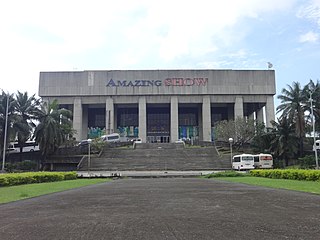Augusto Valdes Pangan, Sr., professionally known as Chiquito, was a Filipino actor and comedian.

Rodolfo Vera Quizon Sr., known professionally as Dolphy, was a Filipino comedian and actor. He is widely regarded as the country's "King of Comedy" for his comedic talent embodied by his long roster of works on stage, radio, television and movies.

The Cinema of the Philippines began with the introduction of the first moving pictures to the country on August 31, 1897, at the Salón de Pertierra in Manila. The following year, local scenes were shot on film for the first time by a Spaniard, Antonio Ramos, using the Lumiere Cinematograph. While most early filmmakers and producers in the country were mostly wealthy enterprising foreigners and expatriates, on September 12, 1919, Dalagang Bukid , a movie based on a popular musical play, was the first movie made and shown by Filipino filmmaker José Nepomuceno. Dubbed as the "Father of Philippine Cinema," his work marked the start of cinema as an art form in the Philippines.

"Macho Man" is a song by American disco group Village People, released as the second single and title song of their album of the same name (1978). The song entered the Billboard Hot 100 on June 24, 1978 before picking up more airplay that August. It became the Village People's first charting hit in the United States, peaking on the Hot 100 at number 25 on the week of September 2.

The Manila Film Center is a building located at the southwest end of the Cultural Center of the Philippines Complex in Pasay, Philippines. The structure was designed by architect Froilan Hong where its edifice is supported on more than nine hundred piles which reaches to the bed-rock about 120 feet below.

Macho Dancer is a 1988 Philippine film, directed by Lino Brocka. It explores the realities of a young, poor, rural gay man, who after being dumped by his American boyfriend, is forced to support himself and his family in Manila's seamy red-light district. The film's frank depiction of homosexuality, prostitution, drag queens and crooked cops, the porn industry, sexual slavery, and drugs and violence caused Filipino government censors to order extensive edits of the film. Brocka smuggled an uncensored cut out of the Philippines to be shown to a limited number of international film festivals. The film received a standing ovation at the 1988 Toronto International Film Festival. Macho Dancer was a box office failure in the Philippines due to its heavy censorship, but achieved international festival and critical success.
Twilight Dancers is the last installment of director Mel Chionglo and writer Ricky Lee's trilogy about Macho Dancers. The first part was Sibak: Midnight Dancers in 1994, and the second part was Burlesk King in 1999. The trilogy took inspiration from Lino Brocka's film Macho Dancer in 1988.
Burlesk King is the second film in the gay-themed trilogy of Mel Chionglo and Ricky Lee about the lives of macho dancers, men who work as strippers in Manila's gay bars. The first is Sibak: Midnight Dancers; the third is Twilight Dancers. Other films exploring the same theme are Lino Brocka's Macho Dancer (1988) and Brillante Mendoza's Masahista.

Agimat, also known as anting or folklorized as anting-anting, is a Filipino word for "amulet" or "charm". Anting-anting is also a Filipino system of magic and sorcery with special use of the above-mentioned talismans, amulets, and charms. Other general terms for agimat include virtud (Virtue) and galing (Prowess).
Rafael Aranda Roco, Jr., professionally known as Bembol Roco, is a Filipino actor whose work ranges from films to television. He is best known for his role as Julio Madiaga in the 1975 film Manila in the Claws of Light, which has since gained prominence as one of the greatest Philippine films of all time. He also had an important role in the 1982 Australian-U.S. film The Year of Living Dangerously. He also portrayed villain roles in Filipino action movies due to his signature bald head as well as various supporting roles.
Ganti ng Puso is a 1996 Philippine action drama film directed by Francis "Jun" Posadas. The film stars Stella Ruiz and Gandong Cervantes. It also marks the film debut of Lara Morena.

Village People are an American disco group known for its on-stage costumes and suggestive lyrics in their music. The group was originally formed by French producers Jacques Morali, Henri Belolo and lead singer Victor Willis following the release of the debut album Village People, which targeted disco's large gay audience. The group's name refers to Manhattan's Greenwich Village, with its reputation as a gay village. The characters were a symbolic group of American masculinity and macho gay-fantasy personas. To date, Willis is the only original member still remaining with the group.

Lolita Rodriguez was a Filipino actress whose career spanned four decades. Regarded as the "Queen of Philippine Drama", she was noted for her restrained, subtle acting style and was famous for her performances in a range of film genres, from drama, comedy and action. She is a recipient of two FAMAS Awards for her portrayal in Gilda (1956) and Weighed But Found Wanting (1974).

Live Show, originally titled Toro, is a Philippine erotic drama film directed and written by Jose Javier Reyes.
The 32nd PMPC Star Awards for Movies, was an accolade to give and honor the Filipino mainstream and independent films, personalities and movie industry stakeholders in the year 2015, organized by the Philippine Movie Press Club, headed by current president Fernan "Miss F" de Guzman and produced by Airtime Marketing Philippines headed by Tessie Celestino-Howard. The awards night was held on March 6, 2016 at the Newport Performing Arts Theater, Resorts World Manila, Pasay and aired on ABS-CBN's Sunday Best on March 13, 2016.
Carmelo Chionglo, better known as Mel Chionglo, was a Filipino film director and production designer. He has directed more than 40 films since 1981.
Nagbabagang Luha is a 1988 Filipino romantic drama film directed by Ishmael Bernal. The screenplay written by Raquel Villavicencio was adapted from the "komiks serial" of the same name written by Elena M. Patron and serialized under Superstar Komiks. It stars Lorna Tolentino, Gabby Concepcion, Richard Gomez, and Alice Dixson.

Itim, released overseas as The Rites of May, is a 1976 Philippine supernatural horror drama film and the feature directorial debut of Mike de Leon, with a screenplay by Clodualdo del Mundo Jr. and Gil Quito. The film, that has been described as "one of the most remarkable debuts in cinema history", stars Tommy Abuel as a young photographer visiting his father in his provincial town during the Lenten season. There he encounters a mysterious woman, Teresa, played by Charo Santos in her acting debut. Itim addresses various topics, including occultism and religion, in a "foray into gothic horror, exploring the spiritual nature of life and people in the quiet little town of San Ildefonso".
Dyesebel is a 1990 Filipino romantic fantasy film based on the Pilipino Komiks character of the same name. Directed by Mel Chionglo from a screenplay by Ricardo Lee, it stars Alice Dixson as the titular character and Richard Gomez, alongside Nadia Montenegro, Dennis Roldan, Chat Silayan, Perla Bautista, Lawrence Pineda and Mario Escudero. Produced by Regal Films, the film was released on January 18, 1990.










